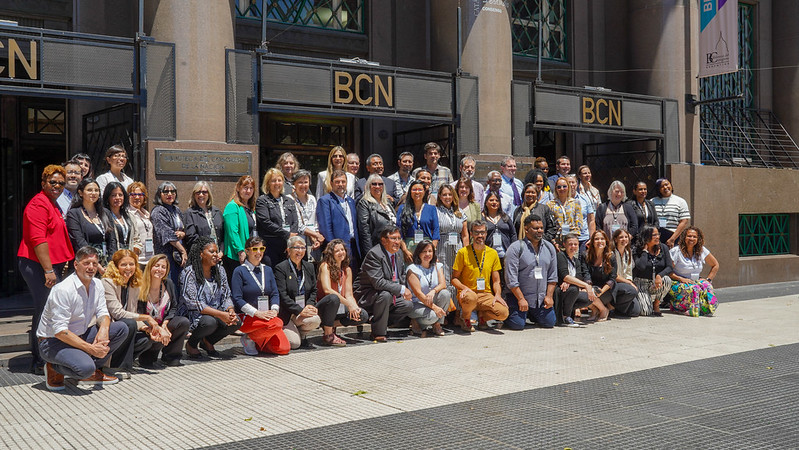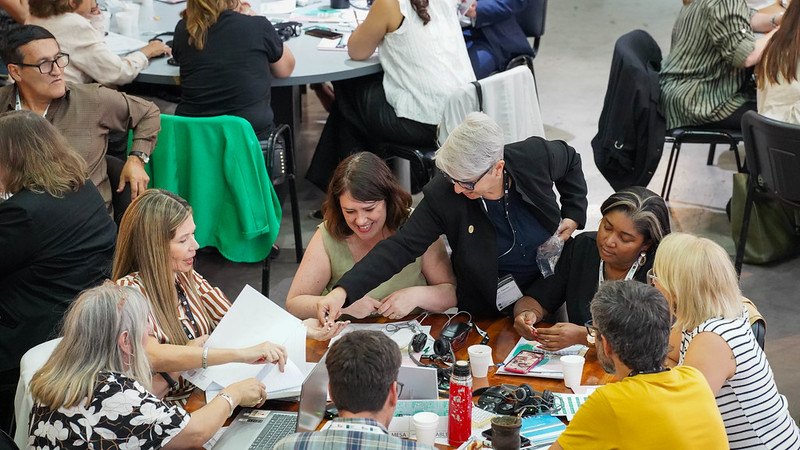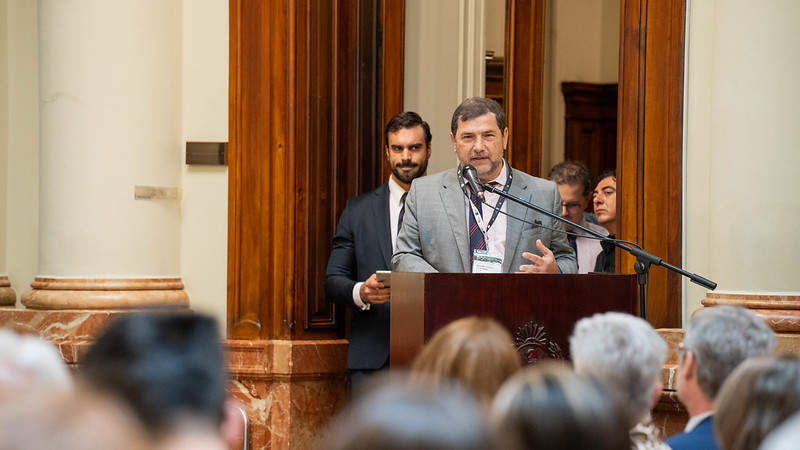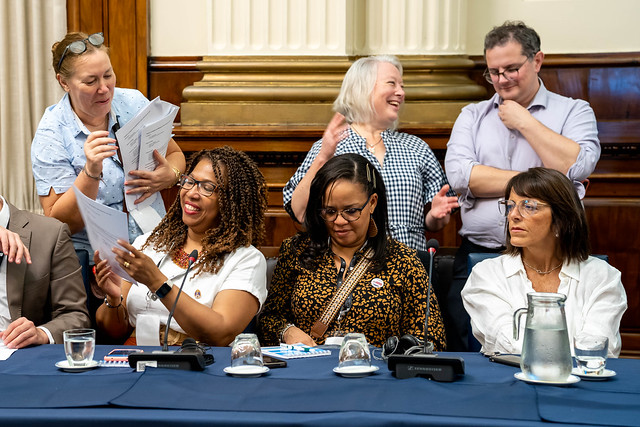A community for change: IFLA regional workshop for strong and sustainable library fields in Latin America and the Caribbean
27 November 2024
An intense series of events and meetings across Argentina and Chile have just come to an end, bringing together workshops, training, network-building, advocacy and opportunities to learn from each other. The result: new energy and new connections that will contribute to stronger and more sustainable library fields in Latin America and the Caribbean. These activities were made possible by financial support from Stichting IFLA Global Libraries.

Central to IFLA’s strategy for ensuring that libraries fulfil their potential to deliver sustainable futures for all is a commitment to ensuring that libraries everywhere, at all levels, are able to work effectively and collaboratively for impact.
In achieving this, working at the regional level has a particular importance, both as a bridge between the global and national, but also as a space for finding solutions to shared challenges.
Following workshops in 2022 in Bangkok (for Asia-Oceania), in 2023 in Nairobi and Brussels (for Sub-Saharan Africa and Europe), it was therefore exciting to be able to create the space for discussions across Latin America and the Caribbean.
Over 40 librarians from 20 different countries around the region joined us across six venues in Buenos Aires, Argentina and Santiago, Chile, for a variety of activities that brought forward the rich experience and potential of the region, and which we hope will catalyse new partnerships and mobilisation.
Tools to trigger reflection
The first two days took place at the Library of Congress of Argentina, hosted by Alejandro Santa, Coordinator and Director General of the library and Chair of IFLA’s Regional Council. These focused on sharing IFLA tools and methods designed to build sustainability thinking in libraries and their associations. By identifying factors of sustainability – such as our relationships, investment in emerging leaders – we can make sure that we are ready for the future.
 Building on this, we also explored experiences of building partnerships with others in order to deliver more than we can alone, as well as tools and techniques for planning for maximum impact, before applying the lessons learned to discussing potential collaborations with United Nations agencies.
Building on this, we also explored experiences of building partnerships with others in order to deliver more than we can alone, as well as tools and techniques for planning for maximum impact, before applying the lessons learned to discussing potential collaborations with United Nations agencies.
In an innovation, our programme on the third day, held in the Argentine Congress, included a workshop exploring how library associations and others can develop their programming to help their own members become more effective copyright educators. Led by Lisa Hinchliffe. This not only provided valuable basic information on copyright, but also on approaches to developing effective training and instruction.
All of these activities are associated with follow-up, with participants developing action plans for how they will draw on the tools and lessons shared in their own contexts, so that as many colleagues around the world as possible benefit.
Engaging the United Nations
On the fourth working day, we were proud to be welcomed to the Hernan Santa Cruz library at the United Nations Economic Commission for Latin America and the Caribbean (CEPAL), in Santiago, Chile.
 With the goal both of demonstrating to UN contacts the relevance and potential of libraries as partners, and stimulating participants to engage with their own national UN offices, this session provided a great opportunity to make connections between the work of libraries and wider development agendas.
With the goal both of demonstrating to UN contacts the relevance and potential of libraries as partners, and stimulating participants to engage with their own national UN offices, this session provided a great opportunity to make connections between the work of libraries and wider development agendas.
Across five sessions, we focused on CEPAL’s overall agenda for productivity and inclusion, as well as its own on digital. We also heard from UNESCO representatives focused on education and culture, and from the Food and Agriculture Organisation (FAO) talking about their work to manage and share knowledge to support agricultural and rural development. Finally, a presentation on the World Bank’s publications offered a very useful overview of the resources available to libraries.
Each session led to discussions that opened the way to ideas for concrete projects to take forwards at the national and regional levels, as well as a new awareness of libraries’ potential and reach among UN contacts.
We were also happy to count on participation from the UNESCO Centre for the Promotion of Books and Reading in Latin America and the Caribbean (CERLALC) throughout the events. CERLALC represents a powerful ally for libraries in the region, and will certainly be part of any follow-up.
Learning and celebrating
Beyond the more formal sessions, and learning from previous experiences, the programme in Argentina and Chile also included more opportunities for informal learning and exchange.
 The Congress of Argentina was the venue for a celebration of the 50th anniversary of IFLA’s Regional Division for Latin America and the Caribbean (previously a section), as well as 20 years since the last and only World Library and Information Congress in South America, held in Buenos Aires in 2004. With many of the people involved in the conference present, as well as a collection of archival video and images, it was a great opportunity to look back at the long-term impact of WLIC.
The Congress of Argentina was the venue for a celebration of the 50th anniversary of IFLA’s Regional Division for Latin America and the Caribbean (previously a section), as well as 20 years since the last and only World Library and Information Congress in South America, held in Buenos Aires in 2004. With many of the people involved in the conference present, as well as a collection of archival video and images, it was a great opportunity to look back at the long-term impact of WLIC.
In Chile, we are very grateful to the National Library for hosting a reception that allowed participants to share more about its projects ahead of its centenary in its current building next year, as well as offering the opportunity to launch the Spanish translation of the Trend Report.
We are also very grateful to the Library of Congress of Chile for hosting a meeting of the Latin America and Caribbean Regional Division Committee, and the Public Library of Santiago for organising a conference on libraries and artificial intelligence, giving a chance to cross regional and national insights.
As underlined above, the work has only just started. From the action plans that our participants will be putting together to the projects that we will work to set up with the United Nations, and of course all that will come from the connections made between the librarians who took part, there there is a lot of follow up.
We look forward to working with colleagues across Latin America and the Caribbean to achieve the goal of stronger and more sustainable library fields, as an indispensable step towards sustainable futures for all.
IFLA is grateful to Stichting IFLA Global Libraries (SIGL) for the financial support that made this workshop possible. SIGL was created by IFLA and the Gates Foundation in order to administer the money granted by the Gates Foundation to support IFLA’s work to strengthen the global library field.
We are also very grateful to Alejandro Santa and the Library of Congress of Argentina team (and in particular the Regional Office) for the venue and support, to Wouter Schalier and the Hernan Santa Cruz Library at CEPAL, to Soledad Abarca and the National Library of Chile, to Maria Angelica Fuentes and the Library of Congress of Chile, and to Paula Larrain, Marcela Valdés Rodríguez and the team at the Library of Santiago for their hospitality.